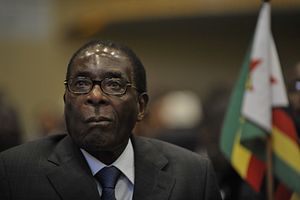If you keep abreast of world news, as I’m sure most Diplomat readers like to do, you may have heard that Robert Mugabe, the unhinged president of Zimbabwe, has won something called the Confucius Peace Prize.
Of course, the notion that Mugabe could be deserving of anything that can remotely be described as a “Peace Prize” is laughable. Mugabe has cracked down on human rights and political opposition. He rules with an iron fist— and he’s driven Zimbabwe’s economy into the ground. If anything, he merits the a prize for adhering most closely to the archetype of irascible, power-mad dictator.
Most headlines have said that the Confucius prize is presented by none other than “China.” “Zimbabwe’s Mugabe nets Chinese peace prize,” “China Awards Peace Prize to African Dictator,” “A ‘peace’ prize for Mugabe: The double-speak behind China’s answer to the Nobel award,” “How can China reward utter failure?” and “‘Chinese Nobel’ Awarded to Dictator and Mass Murderer Robert Mugabe” are just a few examples.
Without knowledge of the origins of the Confucius Peace Prize, an unwitting reader may see these headlines and assume that the Chinese Communist Party-led government of the People’s Republic of China thinks the Alfred Nobel-endowed peace prize, granted by the Norwegian Nobel Committee, is so unfair to Chinese interests that it sought to counter this farce with a prize of its own. This, however, is an oversimplification.
Yes, the Nobel Peace Prize is often politicized for a range of reasons.
Yes, famous Chinese dissident Liu Xiaobo was awarded the Nobel peace prize in 2010, damaging diplomatic relations between China and Norway and generally upsetting China.
But, despite all this, no, the government of the People’s Republic of China is not actually petty enough to resort to establishing what essentially amounts to a parody of the Nobel Peace Prize to make its displeasure with the Norwegian Nobel Committee and Western lionization of Chinese dissidents known to the world.
This article isn’t an attempt to absolve the Chinese government of its complicity in a range of human rights abuses. Instead, it’s an attempt to clarify what many of the headlines on Mugabe’s Confucius Peace Prize don’t tell you.
The Confucius Peace Prize was set up in 2010, after Liu received his Nobel Peace Prize. It was established by a private association of Chinese citizens based in Hong Kong, known as the Association of Chinese Indigenous Arts in the People’s Republic of China. Liu Zhiqin, a prominent businessman who originated the proposal to set up a uniquely Chinese prize, said at the time: “We should not compete, we should not confront the Nobel Prize, but we should try to set up another standard.”
Part of the misunderstanding that the Confucius Peace Prize was endowed and supported by the Chinese government had to do with the Hong Kong group’s assertions that it was working with the Chinese Ministry of Culture (which the ministry has since vehemently denied). Additionally, China’s soft-power spreading Confucius Institutes had been founded in the mid-2000s and were still spreading globally, suggesting to some that the Confucius Peace Prize was a similar push for Chinese values and soft-power.
Since its inception, the Confucius Peace Prize has been awarded roughly around the same time as the Nobel Peace Prize. Before Mugabe, Kofi Annan, the former UN Secretary-General, agricultural scientist Yuan Longping, Russia’s Vladimir Putin, and Fidel Castro of Cuba have been recipients. Additionally, former KMT secretary-general Lien Chan of Taiwan won the inaugural edition of the prize, a development the Taiwanese government found “amusing.”
Differences in values certainly exist between China and the West, but it’s important to understand that the government of the People’s Republic of China hasn’t quite responded to perceived Western affronts with the sort of pettiness that the Confucian Peace Prize represents. So remember, while it is outrageous that Robert Mugabe would win anything called a “Peace Prize,” it’s been given to him by a private group of Chinese citizens based in Hong Kong with no affiliation with the Chinese government.
The conversation between China and the West on human rights is important and it is ongoing, but misconceiving something like the Confucius Peace Prize as emblematic of the Chinese perspective on human rights is immensely unproductive. So, take this as a public service announcement of sorts and please stop treating the Confucius Peace Prize as anything serious or remotely worthy of consideration as representative of Chinese policy.

































